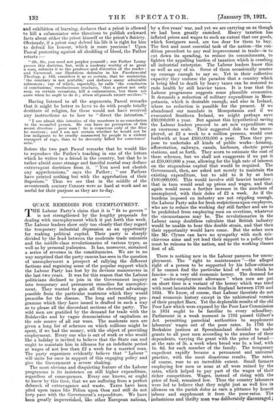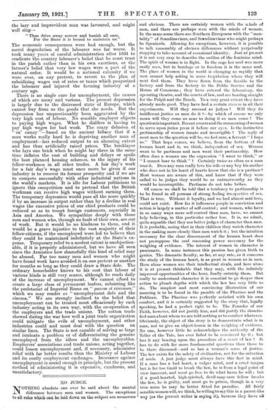QUACK REMEDIES FOR UNEMPLOYMENT. T HE Labour Party's claim that it
is " fit to govern " is not strengthened by the lengthy proposals for dealing with unemployment which it put forth this week. The Labour leaders show only too clearly that they regard the temporary industrial depression as an opportunity for making political capital. Their party is sharply divided by the feud between the moderate trade unionists and the middle-class revolutionaries of various types, as well as by personal jealousies. It has, moreover, sustained a series of reverses in the constituencies. We are in no way surprised that the party caucus has seen in the question of unemployment a prospect of rallying the different factions and regaining some of the popular support which the Labour Party has lost by its devious manoeuvres in the last two years. It was for this reason that the Labour politicians declined to join in the Government inquiry into temporary and permanent remedies for unemploy- ment. They wanted to gain all the electoral advantage possible from the particular nostrums which they would prescribe for the disease. The long and rambling pro- gramme which they have issued is drafted in such a way as to please all the discordant sections of the party. The wild men are gratified by the demand for trade with the Bolsheviks and by vague denunciations of capitalism as the sole source of all our woes. The moderate men are given a long list of schemes on which millions might be spent, if we had the money, with the object of providing employment. Every one who is out of work or who would like a holiday is invited to believe that the State can and ought to maintain him in idleness for an indefinite period at wages of not less than £2 a week for a married man. The party organizers evidently believe that " Labour " will unite for once in support of this engaging policy and give the Government a severe shaking.
The most obvious and disquieting feature of the Labour programme is its insistence on still higher expenditure, regardless of consequences. Every one knows, or ought to know by this time, that we are suffering from a perfect debauch of extravagance and waste. Taxes have been piled upon taxes like Pelion upon Ossa and still do not keep pace with the Government's expenditure. We have been greatly impoverished, like other European nations, by a five years' war, and yet we are carrying on as though we had been greatly enriched. Heavy taxation has inflated prices and wages to such an extent that our goods, which foreigners need, are too dear for them to buy. The first and most essential task of the nation—the con- dition precedent to any real improvement in trade—is to cut down its spending, to reduce its commitments, to lighten the appalling burden of taxation which is crushing all industrial enterprise. The Labour leaders know this as well as any of us. • Some of them occasionally muster up courage enough to say so. Yet in their collective capacity they endorse the paradox that a country which is being bled to death by heavy taxes can be restored to rude health by still heavier taxes. It is true that the Labour programme suggests some plausible economics. It demands a reduction of military expenditure in Meso- potamia, which is desirable enough; and also in Ireland, where no reduction is possible for the present. If we abandoned our mandate in Mesopotamia and if we evacuated Southern Ireland, we might perhaps save £50,000,000 a year. But against this hypothetical saving the Labour leaders proceed to set new expenditure on an enormous scale. Their suggested dole to the unem- ployed, at £2 a week to a million persons, would cost forthwith at least £100,000,000 a year. Then they pro- pose to undertake all kinds of public works—housing, afforestation, railways, canals, harbours, electric power stations, and so forth. They scorn to estimate the cost of these schemes, but we shall not exaggerate if we put it at £50,000,000 a year, allowing for the high rate of interest on the stupendous capital that would be required. The Government, then, are asked not merely to maintain the existing expenditure, but to add to it by at least £100,000,000. This would involve still heavier taxation ; that in turn would send up prices and wages, and that again would mean a further increase in the numbers of unemployed, with their doles of £2 a week. As if the burdens imposed on industry are not crippling enough, the Labour Party asks for fresh restrictions upon employers, who are to reduce the working day still further and are to be prohibited from employing men on overtime, whatever the circumstances may be. The revolutionaries in the Labour camp doubtless calculate that British industry would be unable to bear this double strain, and that then their opportunity would have come. But the sober men like Mr. Clynes can have no sympathy with such mis- chievous aims and yet lend their support to a policy that must be ruinous to the nation, and to the working classes first of all.
There is nothing new in the Labour panacea for unem- ployment. The right to maintenance "—the alleged right of a person to be supported by his fellow-citizens if he cannot find the particular kind of work which he fancies—is a very old economic heresy. The demand for an " under-employment allowance " when men are put on short time is a variant of the heresy which was tried with most lamentable results in England between 1795 and 1834. We know, of course, that Labour theorists do not read economic history except in the unhistorical version of their prophet Marx. Yet the deplorable results of the old Poor Law which were exposed by the Poor Law Commission in 1834 ought to be familiar to every schoolboy. Parliament in a weak moment in 1783 passed Gilbert's Act permitting parochial authorities to supplement labourers' wages out of the poor rates. In 1795 the Berkshire justices at Speenhamland decided to make grants to all poor men according to the number of their dependents, varying the grant with the price of bread— at the rate of 3s. a week when bread was ls. a loaf, with Is. 6d. for each member of the family. The temporary expedient rapidly became a permanent and universal practice, with the most disastrous results. The rates, of course, rose to an incredible extent. Small farmers employing few men or none at all were ruined by the rates, which helped to pay part of the wages of their richer competitors. Wages, instead of rising with the price of food, remained low. Thus the country labourers were led to believe that they might just as well live in idleness on the parish doles as earn a pittance by honest labour and supplement it from the poor-rates. The industrious and thrifty man was deliberately discouraged ; the lazy and improvident man was favoured, and might well sing- " Then drive away sorrow and banish all care, For the State it is bound to maintain us."
The economic consequences were bad enough, but the moral degradation of the labourer was far worse. It took many years of careful administration after 1834 to eradicate the country labourer's belief that he must trust in the parish rather than in his own exertions, or the farmer's belief that very low wages were a part of the natural order. It would be a national calamity if we were ever, on any pretext, to revert to the plan of subsidizing wages out of rates or taxes which pauperized the labourer and injured the farming industry of a century ago. There is no single cure for unemployment, the causes of which are many and various. The present depression is largely due to the distressed state of Europe, which cannot buy from us the goods that she needs. But the depression has unquestionably been aggravated by the very high cost of labour. No sensible employer objects to paying high wages. What he dislikes is having to pay high wages for bad work. The crazy delusion of ' ca' canny "—based on the ancient fallacy that if a man works really hard he is depriving another man of employment—has reduced output to an alarming extent and has thus artificially raised prices. The bricklayer who lays one brick when he might lay three in the same time inflates the cost of building and delays or spoils the best planned housing schemes, to the injury of his fellow-workmen in all other trades. A fair day's work for a fair day's wage must once more be given if our industry is to recover its former prosperity and if we are to compete successfully with other industrial nations in the world's markets. It is idle for Labour politicians to ignore this competition and to pretend that, the British workman can receive high wages without earning them. The temporary depression would pass all the more quickly if by an increase in output rather than by a decline in real wages the excessive prices of our chief products could be reduced so as to tempt foreign customers, especially in Asia and America. We sympathize deeply with those men and women who, through no fault of their own, are out of work. But it would be no kindness to them, and it would be a grave injustice to the vast majority of their fellow-citizens, if the unemployed were led to believe that they could be maintained indefinitely at the State's ex- pense. Temporary relief to a modest extent is unobjection- able, if it is properly administered, but we have all seen since the Armistice how shamefully this kind of relief may be abused. Far too many men and women who might have found work have avoided it on one pretext or another for months so long as they could draw a State dole. The ordinary householder knows to his cost that labour of various kinds is still very scarce, although he reads daily of the increase of unemployment. We cannot afford to create a large class of permanent loafers, subsisting like the' proletariat of Imperial Rome on " panem et circenses," which we may render as " unemployment dole and the cinema." We are strongly inclined to the belief that unemployment can be treated most efficaciously by each industry acting in its own way, with the co-operation of the employers and the trade unions. The cotton trade showed during the war how well a joint trade organization could mitigate the evils of unemployment, and other industries could and must deal with the question on similar lines. The State is not capable of solving so large and intricate a problem or of differentiating the genuine unemployed from the idlers and the unemployables. Employers' associations and trade unions, acting together, could lessen unemployment and, if necessary, administer relief with far better results than the Ministry of Labour and its costly employment exchanges. Insurance against unemployment is sound enough in principle, but the present method of administering it is expensive, cumbrous, and unsatisfactory.



































 Previous page
Previous page